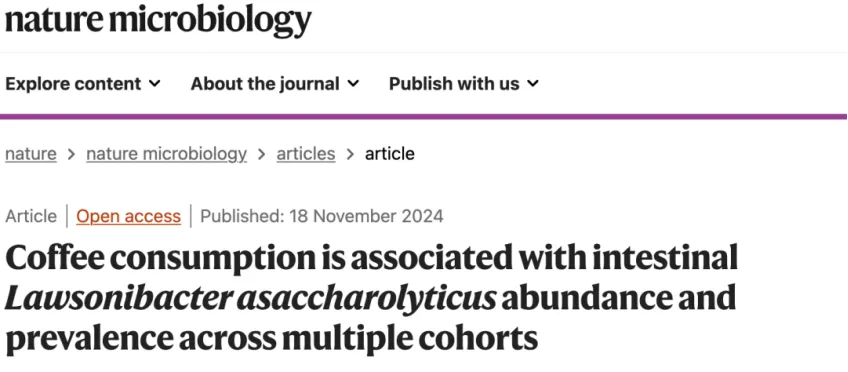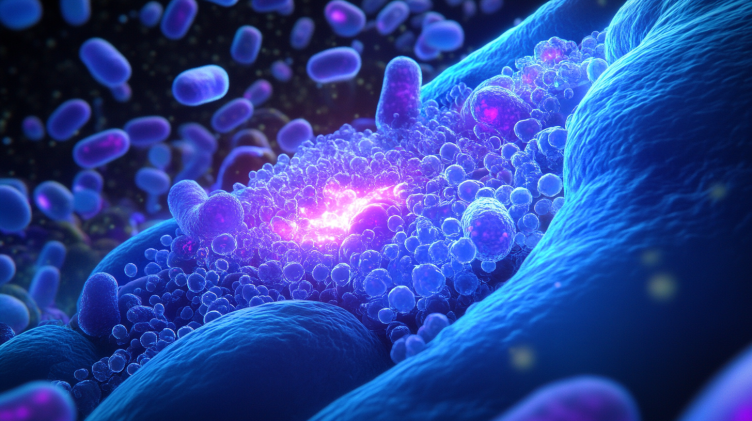Coffee is widely known as a powerful tool for boosting energy and preventing drowsiness. For many, drinking 2-3 cups of coffee a day has become a routine. Numerous studies have confirmed that drinking coffee can indeed offer several health benefits. But what differences might there be between those who regularly drink coffee and those who don’t? A recent study from Harvard University reveals just how much coffee can impact our bodies.
The Impact of Coffee on Gut Health
In November 2024, researchers at Harvard University published a study in the journal Nature Microbiology, examining the gut microbiome of over 20,000 participants. The study found that regular coffee consumption significantly alters the gut microbiota. Those who drank three cups of coffee daily had 4.5 to 8 times more beneficial bacteria (L. asaccharolyticus) in their intestines compared to individuals who drank fewer than three cups per month.

Research screenshots
This study is the largest to date examining the link between coffee consumption and gut microbiota. Participants were divided into three groups:
- Group 1: Those who do not drink coffee (fewer than 3 cups per month)
- Group 2: Heavy coffee drinkers (more than 3 cups per day)
- Group 3: Moderate coffee drinkers (between the two extremes)
The study found a clear connection between coffee consumption and the gut microbiome, with coffee showing the strongest link among over 150 foods studied. Heavy coffee drinkers had significantly higher levels of beneficial bacteria, particularly L. asaccharolyticus, which plays a key role in gut health.

Three Key Differences Between Regular Coffee Drinkers and Non-Coffee Drinkers
1. Significant Differences in Gut Microbiota
As mentioned earlier, coffee consumption leads to a higher level of L. asaccharolyticus, a beneficial gut bacterium that helps produce butyrate. Butyrate is vital for maintaining gut barrier function and preventing conditions such as colitis and colon cancer. Regular coffee drinkers exhibit higher levels of this bacterium compared to those who do not drink coffee.

2. Lower Risk of Facial Skin Aging
A study has shown that drinking coffee regularly can help lower the risk of facial skin aging. The research analyzed the effects of four different beverages—tea, coffee, alcohol, and sugary drinks—on skin aging. Among these, only coffee was found to effectively reduce the risk of facial aging, with coffee consumption decreasing the likelihood of skin aging by 15%. In contrast, no clear connection was found between the other beverages and facial skin aging.

Research screenshots
In fact, coffee may have anti-aging benefits for the skin. A 2014 study published in the International Journal of Dermatology found that coffee intake protects the skin from photoaging and reduces pigmentation. Researchers suggest that polyphenols like chlorogenic acid found in coffee are responsible for its skin-protective effects.

3. Lower Risk of Cardiovascular Diseases
A 2022 study published in European Journal of Preventive Cardiology revealed that drinking 0.5 to 3 cups of coffee per day is associated with a 12% decrease in all-cause mortality and a 17% reduction in cardiovascular disease mortality. Coffee contains bioactive compounds such as caffeine and polyphenols, which have antioxidant and anti-inflammatory effects. These compounds help protect the body’s cells from free radical damage and support the proper functioning of organs, particularly the cardiovascular system.

Healthy Coffee Drinking: 5 Key Tips
While coffee offers numerous health benefits, it’s important to consume it wisely. Here are five essential tips for healthy coffee drinking:
1. Don’t Drink Coffee Too Hot
Whether it’s coffee or any other hot beverage, avoid drinking it at temperatures that are too high. In 2016, the International Agency for Research on Cancer (IARC) classified beverages hotter than 65°C as possibly carcinogenic. It is advised to drink coffee at a safe, moderate temperature.

2. Limit Your Intake to 5 Cups Per Day
It is recommended to limit coffee consumption to no more than five cups per day. For healthy adults, drinking between 3 to 5 cups (equivalent to 210-400 mg of caffeine) is optimal. A standard coffee cup size is typically 120-140 ml.

3. Avoid Drinking Coffee Too Late
It is best to drink coffee in the morning or after lunch. Drinking coffee too late in the day can interfere with sleep and disrupt your circadian rhythm. Morning consumption can help boost metabolism and improve digestion.

4. Don’t Drink Coffee on an Empty Stomach If You Have a Sensitive Stomach
For those with digestive issues, especially chronic gastritis or acid reflux, it’s advisable not to drink coffee on an empty stomach. The acidity in coffee may aggravate gastrointestinal conditions.

5. Don’t Force Yourself to Drink Coffee If It Doesn’t Suit You
Not everyone reacts to coffee the same way. Some individuals may experience discomfort such as frequent urination, palpitations, or digestive issues when drinking coffee. If you don’t enjoy coffee or experience negative effects, there’s no need to force yourself. You can still benefit from other healthy lifestyle habits.
By following these tips and understanding the benefits, coffee can be a wonderful addition to your daily routine, promoting better gut health, skin health, and reducing the risk of heart disease. Drink it wisely, and enjoy the health benefits it brings!



















